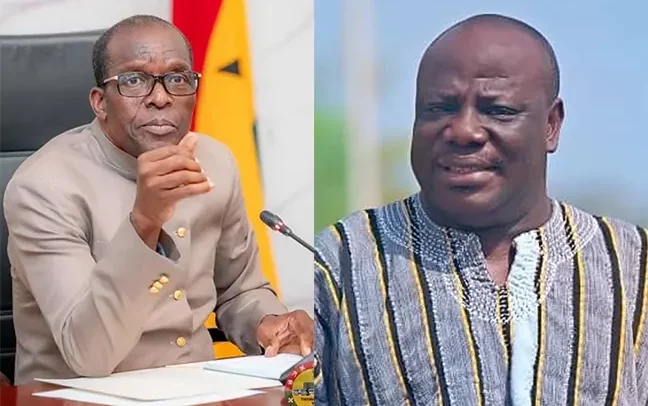Alban S.K. Bagbin and Matthew Nyindam
The Speaker of Parliament, Alban S.K. Bagbin, has ruled that it is premature to declare the Member of Parliament (MP) for Kpandai, Matthew Nyindam, disqualified from Parliament despite a recent High Court order directing a re-run of the constituency’s parliamentary election.
Addressing the House yesterday, the Speaker disclosed that Parliament had formally been served with an order of the Tamale High Court, which was directed at the Clerk to Parliament.
The order instructed the 2nd respondent in an election petition, the Electoral Commission, to conduct a re-run of the Kpandai parliamentary election within 30 days.
The court order follows an election petition filed by the 2024 National Democratic Congress (NDC) parliamentary candidate, Daniel Nsala Wakpal, who challenged the declaration of Mr. Nyindam as the duly elected Member of Parliament for the Kpandai Constituency after the December 7, 2024 parliamentary elections.
At first reading, the order appears to suggest that the original declaration of Mr. Nyindam as winner of the election is invalid, thereby implying that he is no longer a Member of Parliament.
However, Speaker Bagbin stressed that a deeper consideration of the law, particularly the rules on appeals, shows that such a conclusion cannot yet be sustained.
Citing the Court of Appeal Rules, 1997 (CI 19), as amended by the Court of Appeal Rules, 2020 (CI 132), specifically Rule 27(3), the Speaker explained that every High Court judgment that is capable of appeal is automatically subject to a mandatory seven-day statutory stay of execution from the date the judgment is delivered.
Rule 27(3), he noted, provides that “there shall be a stay of execution of the judgment or decision appealed against for a period of seven days immediately following the giving of notice of the judgment or decision.”
This provision, according to the Speaker, is mandatory and applies to all High Court decisions that can be appealed.
He further referenced the decision of the Supreme Court of Ghana in Mensah v. Ghana Commercial Bank (2005–2006), where the apex court held that any attempt to execute a High Court judgment before the expiry of the mandatory seven-day stay is premature and void.
He also quoted a more recent affirmation of that legal position by the Court of Appeal in Clennam Construction Limited v. Falcon Crest on April 7, 2022.
According to the Speaker, the rationale behind the statutory stay is to afford the losing party adequate time to study the judgment and decide whether to appeal or seek further relief.
Until that window elapses, the judgment cannot lawfully be executed, he added.
In the specific case of the Kpandai election petition, the Speaker noted that the ruling of the Tamale High Court was delivered on November 24, 2025. Consequently, the statutory seven-day stay of execution remains in force until December 1, 2025.
During this period, Speaker Bagbin said, the High Court ruling cannot form the legal basis for him, as Speaker, to instruct the Clerk of Parliament to notify the Electoral Commission that the Kpandai parliamentary seat is vacant.
He further explained that should Mr. Nyindam exercise his constitutional right of appeal and file the necessary application under Rule 27(1) of CI 19 within the seven-day stay period, the law may impose an additional suspension on the enforcement of the High Court judgment until the appeal is finally determined by the appropriate court.
“These processes are in place to ensure that the subject matter of the litigation is not altered or prejudiced while legal processes are pending,” the Speaker stated.
He also drew the attention of the House to Articles 97 and 99 of the 1992 Constitution, which regulate the qualification, election, and vacation of parliamentary seats.
He explained that until all applicable legal processes are exhausted, changes to a Member’s status must be approached with caution.
In addition, Speaker Bagbin cited Article 105 of the Constitution, which makes it a criminal offence for a person to sit or vote in Parliament “knowing or having reasonable grounds of knowing” that he or she is not entitled to do so.
However, he stressed that Article 105 is penal in nature and must be strictly interpreted. As long as the statutory stay of execution remains in force, the affected Member cannot be said to have knowledge of disqualification in the legal sense.
“It is therefore too premature to say that Hon. Matthew Nyindam is disqualified from entering and participating in the proceedings of the House while this period still falls within the seven-day mandatory stay of execution of the order,” the Speaker ruled.
He explained further that the High Court order was not a declaratory order, but an executory one. As such, it is subject to the statutory stay provided by law.
On that basis, the Speaker affirmed that Mr. Nyindam was within his rights to have been present in the House on Tuesday, November 26, 2025, and to have participated fully in parliamentary proceedings.
The ruling effectively maintains the status quo in Parliament until the expiration of the statutory stay or until further directions are given by an appellate court in the event of an appeal.
By Ernest Kofi Adu, Parliament House


